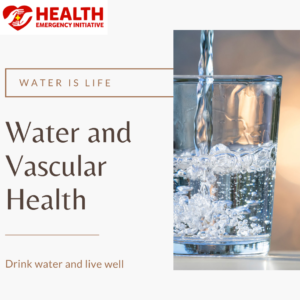
Water is important for vascular health and it makes up to 60% of your body weight, as well as 90% of your blood volume. Every cell, tissue, and organ needs water for proper functioning. Water expels waste from the body via urination, perspiration, and bowel movements. Cardiovascular diseases are diseases that affect the heart and vascular organs such as strokes, angina, heart attack, atherosclerosis, arrhythmia, and others. CVDs are the number one cause of death globally.
Dehydration with respect to vascular system
Dehydration negatively impacts the heart and cardiovascular system. When dehydration occurs, the blood volume or amount of blood circulating the body decreases. And in order to make up for this, the heart beats faster, increasing the heart rate and blood pressure. Also, when dehydration occurs, the blood retains more sodium (salt) which thickens the blood, making it harder for circulation in the body.
Water intake has been clinically proven to be prevention and remedy for cardiovascular diseases (drinking at least 5 glasses of water per day reduces your risk for heart disease). When the human body is hydrated, the heart pumps blood more easily and allows oxygen to reach your muscles, thus helping them work efficiently.
Importance of water in relation to your vascular health
- Water influences the reduction of oxidative stress by lowering sever arrhythmia (irregular heartbeat) and improving the overall function of the heart
- Water improves and maintains blood pressure
- Water protects the blood vessels by preventing chronic inflammation that can cause vascular damage
- National Center for Biotechnology Information has also validated the effect of drinking water with respect to improving moods, anxiety, and autonomic nerve function in our daily life.
What amount of water should I consume daily? The U.S. National Academies of Sciences, Engineering, and Medicine determined that women should consume 11 cups of water per day (2.5 liters), while men should consume 15 cups of water per day (3.5 liters). It is also essential to start your day with a glass cup of water.
What makes water the best fluid? Water is the best fluid because it is free from calories, inexpensive, and readily available. Fruits and vegetables provide a significant amount of water. Caffeinated drinks like coffee and soda can contribute to our daily water intake, caffeine acts as a diuretic and causes more fluid loss, while excess sugar on the other hand can inhibit the body from absorbing water. Sport drinks tend to be high in added sugars and calories, and should only be used when exercising intensely for more than an hour. Energy drinks are different from sport drinks because they are not formulated to replace electrolytes. They contain high amounts of caffeine, stimulants, sugar and other additives.
Signs of mild to moderate dehydration includes: thirst, dry/sticky mouth, not urinating much, dark yellow urine, muscle cramps.
Signs of severe dehydration: not urinating, very dark yellow/amber colored urine, dry skin sunken eyes, irritability/confusion, dizziness/lightheadedness, rapid heartbeat and breathing.
Other benefits of water includes:
- It lubricates the joint
- It forms saliva and mucus for proper digestion, as well as keeping the mouth, nose, and eyes moist
- It carries oxygen throughout the body
- It enhances skin health
- It cushions the brain, spinal cord, and other sensitive tissues. It is also involved in the production of hormones and neurotransmitters, and as such, prolonged dehydration can lead to problems with thinking and reasoning, and can also affect the brain structure and function
- It regulates the body temperature
- The digestive system depends on it- our bowels need water for proper functioning. And so shortage of water leads to constipation and an overly acidic stomach. This is, in turn, increases the risk of heartburn and stomach ulcers
- Flushes blood waste
- Makes minerals and nutrients accessible
- It prevents kidney damage- the kidney is responsible for regulating fluids in the body, therefore, insufficient water can lead to kidney stones and other kidney-related issues.
Health Emergency Initiative provides first responders training to people from all walks of life and makes saving lives a practical norm in society. Sign up for a First Responder training today.
